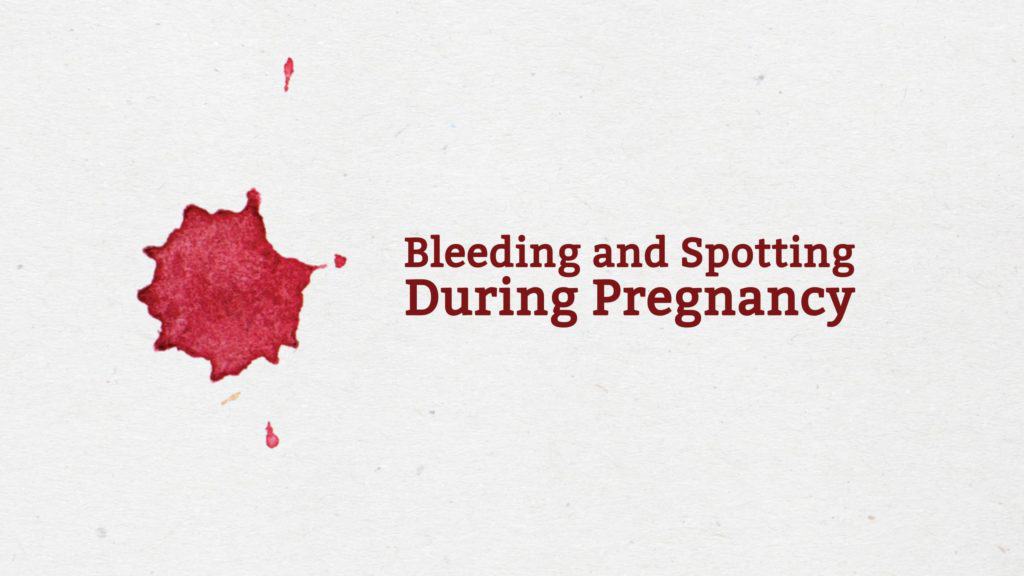
Table of Contents
From troublesome to benign, spotting or bleeding during pregnancy can mean plenty of things. However, before you panic, read a bit more about vaginal bleeding during pregnancy.
As a pregnant woman, even the slightest vaginal blood discharge can be alarming, however, bleeding isn’t always a sign that something might be wrong. In the first trimester, an estimated 15 – 25% of pregnant women experience bleeding. However, most then go on to have perfectly healthy pregnancies and babies. So if you notice only light spotting, take a deep breath and read on for a most likely reassuring explanation.
How to tell the difference between spotting or bleeding during pregnancy ?
To put it simply, if what you see is brown or pink, which is similar to what you see at the end of your period, it’s spotting. However, if you see bright red, consider it bleeding. Remember the amount of blood that you see is another red flag, as spotting doesn’t soak a sanitary napkin however bleeding may.
What causes vaginal spotting during pregnancy ?
Light spotting is usually harmless. It’s caused by one of the following:
Spotting or Bleeding During Pregnancy: During Your First Trimester
Implantation bleeding: During the early part of pregnancy, the implantation of the embryo into your uterine wall can cause spotting. It usually occurs before (or in some cases round the time) you expected your period or about 6 to 12 days after conception. Lighter than a period and lasting anywhere from a few hours to a few days, it’s usually spotty and light- to medium pink or brown. Implantation bleeding isn’t a symbol that something is wrong.
Spotting or Bleeding During Pregnancy: During Your Third Trimester
Loss of mucus plug. The blood-streaked mucus may indicate the start of labor.
Spotting or Bleeding During Pregnancy: Anytime During Pregnancy
- Sex or an internal pelvic exam/pap smear: During pregnancy, your cervix becomes tender and engorged with blood vessels so any type of slight bumping (like sexual intercourse or an internal exam) may irritate the cervix and cause some bleeding. This sort of bleeding is common as it can happen any time during pregnancy and usually doesn’t indicate a problem at all. But for extra reassurance inform the health care professional.
- Infection of the vagina (such as bacterial vaginosis) or cervix: As mentioned, if your cervix is irritated or inflamed you might see some bleeding however, the spotting should disappear once you’re treated for the infection.
- Subchorionic bleeding: In some cases, blood accumulates within the folds of the chorion (the outer fetal membrane, next to the placenta) or between the uterus and the placenta this can cause light to heavy spotting. Usually, it does not become a problem for the pregnancy and resolves on its own.
What leads to bleeding during pregnancy ?
At almost any time in your pregnancy, experiencing heavier vaginal bleeding is rarely entirely harmless. As this could mean any number of pregnancy complications, pinpointing the cause should be entrusted to your practitioner. Here are a few possible causes:
During your first trimester
- Ectopic pregnancy: A nonviable pregnancy occurs when a fertilized egg implants outside of the uterus. It requires immediate medical attention. This can cause excessive vaginal bleeding and intense sharp abdominal pain, sometimes followed by rectal pressure, shoulder pain, lightheadedness, fainting, or shock.
- Molar pregnancy: It is a rare condition discovered within weeks of conception. The placenta becomes a mass of cysts along with a malformed or nonexistent embryo. In addition to vaginal bleeding, you’ll ever so often also experience severe nausea, vomiting, and cramping.
- Miscarriage: Or pregnancy loss occurring before week 20, is most often related to chromosomal or other genetic defects of the embryo. It can be a result of hormonal or other factors. Heavy vaginal bleeding which is similar to a period may be accompanied by severe cramping or pain in the center of the lower abdomen or back which noticeably decreases in early pregnancy (like breast tenderness, morning sickness) it’s different from the gradual diminishing as the first trimester comes to a close.
Remember if you do experience early pregnancy loss, do know that in no way it predicts that you won’t be able to later carry a perfectly healthy baby to term. Also know that you’re not alone: Around 20% of conceptions end in miscarriage, even though well over half go unnoticed as they occur so early that a woman doesn’t realize she’s pregnant yet.
Please interlink ‘Miscarriage: Causes, Signs, and Symptoms’.
Late in your second trimester or anytime in your third
- Placenta previa: This happens when the placenta covers part or all of the cervix. It can be generally spotted on a second-trimester ultrasound, although sometimes it can be seen in the third trimester with bright red bleeding. For most women, the placenta moves away before birth. Make sure to consult your doctor right away if you experience bleeding. When placenta previa is accompanied by bleeding, your doctor will likely put you on pelvic rest (no sex) with advice to take it easy and avoid strenuous activity or exercise. They will also monitor you closely to watch out for a more complicated placental condition or preterm labor.
- Placental abruption: It is the early separation of the placenta from the uterine wall. It predominantly occurs in the second half of pregnancy and usually in the third trimester. Additionally to light-heavy bleeding, with or without clots, you’ll notice abdominal aching or cramping, uterine tenderness, and pain in the back or abdomen. If the separation is little, there’s usually little danger to you or your baby and you’ll also be monitored closely and told to take it easy. However, if it’s more severe, you may need to be hospitalized, which is why it’s so important to see your doctor.
- Preterm labor: This labor occurs anytime after week 20 and before week 37 of pregnancy. It is accompanied by other signs of labor like regular contractions which intensify and become more frequent even when you change positions, back pressure, and unusual pelvic pressure. If you suspect labor is starting prematurely, contact your ob-gyn immediately.
Please interlink ‘What is Preterm Labor’.
Early Signs of Pregnancy
Is spotting or bleeding during pregnancy something to worry about ?
Remember, light spotting is as inconsistent in normal pregnancy as it is common. It is usually nothing to be concerned about. For their entire pregnancies, some women spot on and off, while others spot for just a day or two or a few weeks. Most women who experience any kind of spotting go on to have completely normal and healthy pregnancies and deliver perfectly healthy babies.
However, heavy bleeding that soaks through a pad always warrants a call to your doctor, especially if it’s accompanied by cramps or pain. However, do remember that it’s not inevitably a sign that you’re miscarrying. Some women still deliver healthy babies after bleeding heavily for unknown reasons throughout their pregnancies.
What to do if you notice bleeding or spotting ?
When concerned, don’t hesitate to talk to your doctor. There’s no need to call outside of office hours unless you’re bleeding heavily or even experiencing bleeding that looks like a period. Your ob-gyn will likely either order a blood test (to check hCG levels) or perform an ultrasound. They may also do an exam to check your cervix. If you’re in your early pregnancy, i.e. past week 6, during the ultrasound you’ll probably be able to see your baby’s heartbeat, which will reassure you that your pregnancy is progressing just fine.
That’s all folks! This was all about the spotting during pregnancy and what causes it in the first place. However, do you also often find yourself cramping during your trimester and wonder what causes it? Don’t worry! Parenthood bliss has curated an article about everything you must know about the cramps you experience while pregnant.
Spotting or Bleeding During Pregnancy Final Conclusion
Spotting or Bleeding during pregnancy isn’t always a trigger for panic. During early pregnancy, many women experience bleeding in the first trimester. It’s completely normal to experience some spotting after sex, for example.
Call your doctor if the spotting doesn’t stop on its own or if it gets heavier. Also let your doctor know if you are experiencing any other symptoms along with spots, such as cramps, backache, or fever as it can be a cause for concern.
Remember that a lot of women who experience spotting go on to have healthy pregnancies and have healthy babies. Your doctor can help evaluate your symptoms and lessen your worries
Spotting or Bleeding During Pregnancy FAQs
1) How long does spotting last in early pregnancy ?
2) Can I take a pregnancy test while spotting ?
3) Can stress cause spotting in pregnancy ?
Sources:
Reviewed By:

Esha Chainani - Obstetrician and Gynaecologist
Dr. Esha Chainani is an Obstetrician, Gynaecologist, and laparoscopic surgeon who aims to break the stigma around women’s health by advocating an inclusive and open practice of obstetrics and gynecology and an author of several internationally published research papers and health articles in the media like the Swaddle.
She also founded Premaa, a non-profit to reduce maternal morbidity and eventual maternal mortality by providing lower-income pregnant women living in urban areas with cell phone access through an app that can feature an entire section about contraception as well for a whole gamut of reproductive health.
A panel for multiple health sessions including with the UN, USAID, BMC, gender at work, and multiple non-profit organisations, and is on the advisory panel of the South Indian medical students association.





